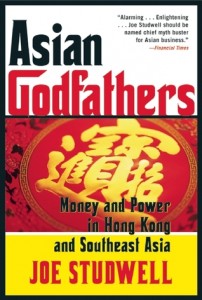A Book Review by Stefanie Field
Asian Godfathers by Joe Studwell
 I’m not sure I can recall how many MBA colleagues at my university raved about this book. Falling for the hype and studying international relations, I was most definitely interested in the rise and fall of the ‘Asian Tigers’ economies. But more interestingly, I was intrigued by the author’s argument against the culture-based theory of Chinese ethnic minorities running Southeast Asian economies simply because Confucian ideals made Chinese people naturally gifted with business. Rather, he immediately confronts this with thorough research and analysis on the ‘Godfathers’ of Southeast Asia and Hong Kong. Do ‘Asian Values’ really play into their success? What really makes the economies of Asia different from the West? How have the godfathers managed to remain at the top of the economic centers for decades? What strategies do they use?
I’m not sure I can recall how many MBA colleagues at my university raved about this book. Falling for the hype and studying international relations, I was most definitely interested in the rise and fall of the ‘Asian Tigers’ economies. But more interestingly, I was intrigued by the author’s argument against the culture-based theory of Chinese ethnic minorities running Southeast Asian economies simply because Confucian ideals made Chinese people naturally gifted with business. Rather, he immediately confronts this with thorough research and analysis on the ‘Godfathers’ of Southeast Asia and Hong Kong. Do ‘Asian Values’ really play into their success? What really makes the economies of Asia different from the West? How have the godfathers managed to remain at the top of the economic centers for decades? What strategies do they use?
The philosophy of Asian Values, strongly advocated by former Prime Minister Lee Kuan Yew of Singapore, advocates that certain ideological norms of Asia makes it impossible for the West to ever impose their influence on the region. This concept includes collectivism (as opposed to individualism), pietal loyalty to family, the support of authoritarian governments, and a few other important notions. While Confucianism and Buddhism are a large basis of Asian history, Studwell’s book argues that the Chinese minorities who currently own the economies of Hong Kong, Singapore, Thailand, Malaysia, the Philippines, and Indonesia, are not successful because of their DNA. Instead, the historical context of colonialism in the region has positioned Chinese communities in specific roles of the state, and certain individuals have simply taken advantage of their condition, legally or not. Moreover, Southeast Asian economic elites are not within the same social group as the region’s political elites. Since the ‘Asian Godfathers’ pose little threat to take influence from the indigenous political parties, an understanding relationship emerges which benefits the two different communities.
Studwell provides a great analysis of the close but separate relationship among the Southeast Asian elites. He goes into great detail about the rise of many Asian Godfathers since the periods of de-colonization in each state. He also remarks on the general lack of innovation in the region due to the management of the economies while leading into the gritty details of the 1997 Asian Financial Crisis. (Note that this book was published in 2007, before the 2008 Financial Crisis.)
I enjoyed this book for my own personal knowledge of the region and I can certainly say I will not look at Hong Kong in the same light again. Studwell obviously does his research and his various specific examples contribute to understanding of Southeast Asian microeconomics. However, the organization of this book was terrible. So many godfathers and so many different countries to discuss. I understand he was trying to follow a timeline of the region, but I ended up just bouncing back and forth among godfathers and nations. By the time I read a third of the book, I could no longer place who with which country or what industries he owned. It would be wise to make some sort of reference list when reading this, since Studwell provides none.
I was also worried that the business jargon would go over my head since I’m unfamiliar with economic studies. I did get lost a few times, particularly when it came to banks. But I was able to understand a relatively decent amount of his research despite the economic language, because the political relations among the states and godfathers are a very important aspect of this book.
In the end, I give this book three out of five stars.
✭✭✭✩✩
Very informative read. Not too difficult to understand, but still mostly recommended for business/economic professionals.
Stefanie Field is a graduate student pursuing a Master’s Degree in International Relations in Bangkok. She is a lover of books and hopes to promote reading culture in Thailand.

